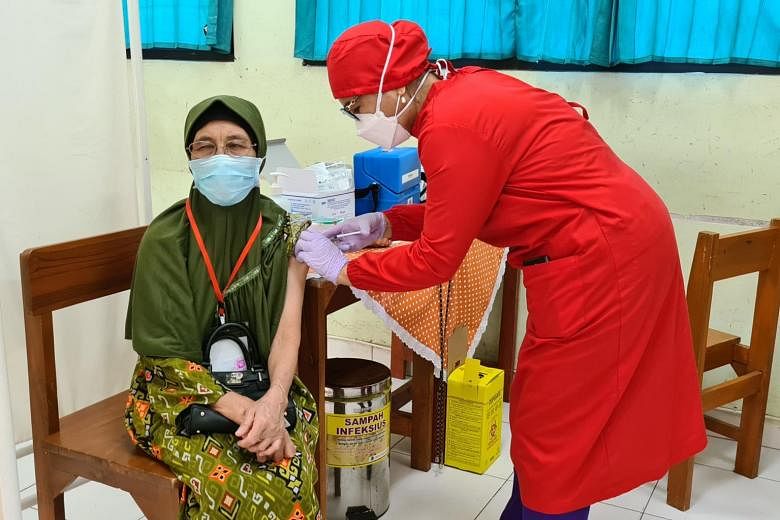JAKARTA - In March this year, 60-year-old Siti Umayah received an invitation to have a Covid-19 vaccination shot from her village in Grobogan, Central Java.
But she was rejected after a nurse on duty found she had tested positive for Covid-19 last December.
In Indonesia, someone infected with Covid-19 can get a jab at least three months after testing negative for the virus.
"My mother was told to wait, but until now there's no more invitation (for her) to get the vaccine again," Ms Evi Nursiamah, Ms Siti's daughter, told The Straits Times.
Ms Siti is among the majority of Indonesia's elderly who have not been inoculated against the coronavirus, even as the country speeds up its nationwide vaccination programme to hit two million doses a day starting this month.
Indonesia reported 6,731 new cases on Wednesday (Sept 8), bringing the total to 4.15 million, while recording 626 deaths in the past 24 hours, resulting in overall deaths of 137,782.
The nationwide vaccine roll-out started in mid-January with shots provided to health workers. Although the vaccination for senior citizens began shortly after in mid-February, only 3.9 million of those aged 60 and above, or 18.1 per cent of the overall 21.6 million senior citizens targeted, have been fully vaccinated as of Wednesday.
Only 5.5 million, or a quarter of them, meanwhile, have received their first doses.
In contrast, the coverage of other priority groups has exceeded targets. For example, more than 1.5 million health workers and 17.3 million public officers have been fully vaccinated.
Fully vaccinated medical workers also started receiving booster shots in mid-July amid a record-breaking surge in new infections and deaths triggered by the more transmissible Delta variant.
Indonesia's Deputy Health Minister Dante Saksono Harbuwono has underlined the need to accelerate vaccination of the elderly as more than half of the deaths in hospitals had come from the group, especially those with underlying conditions, or comorbidities.
"The number of elderly people who have been inoculated remains very low even though they are the most vulnerable to infections," he said recently during a vaccine arrival ceremony.
The health authorities have cited various reasons why many senior citizens have not been inoculated, including hesitancy and comorbidities, such as hypertension and diabetes.
Ms Siti, for instance, has changed her mind and is now unwilling to be vaccinated, because of hoaxes she heard from people at the market where she sells kitchen utensils.
"My mother believes a person died after getting vaccinated. She now becomes scared," said Ms Evi, who is persuading her mother to be inoculated and plans to request another invitation from her village administration.
Indonesia, home to 270 million people, seeks to inoculate 208.3 million, or 77 per cent of its population, by January next year. Around 39.7 million, or nearly one fifth of the target, have been fully vaccinated.
As the vaccination programme picks up pace, the elderly, along with other vulnerable groups such as people with disabilities, have to deal with issues including limited vaccine supply.
In Klaten, Central Java, the local government has vowed to prioritise the elderly to get vaccinated because of the high number of fatalities involving unvaccinated senior citizens with comorbidities. Only 27.15 per cent of the targeted 165,595 senior citizens have been vaccinated.
Although 55 health facilities stand ready to speed up the regency's vaccine roll-out, a shortage of supply hinders the progress.
"All health facilities are capable of inoculating 19,000 doses to residents a day. But the vaccine supply (to match the capability) is unavailable," Mr Ronny Roekmito, an official of Klaten's administration, was quoted as saying by Kompas.com.
Those with disabilities, indigenous communities and other groups across the country have also struggled to get vaccinated, local media reported.
The Health Ministry seeks to inoculate 562,242 people with disabilities, aiming to cover the first 225,000 across the populous islands of Java and Bali by October. But only 16,450 have managed to secure their first dose after the roll-out began in early June.
"Many disabled people are still unreachable. Their families do not have vehicles to take them to vaccination centres. They also face difficulties (getting) them out of home," Ms Suryatiningsih Budi Lestari told The Straits Times. She leads Ciqal Foundation, a Yogyakarta-based advocacy group for people with disabilities.
The group, along with others, have collaborated with the private sector and philanthropic organisations to pick up people with disabilities and transport them to vaccination venues. As a result, 62 per cent of people with disabilities in Yogyakarta have been vaccinated, Ms Suryatiningsih said, noting the rest comprise those with severe conditions, such as cerebral palsy.
"Now, it depends on the government," she added. "We hope it will carry out the vaccination door to door."












